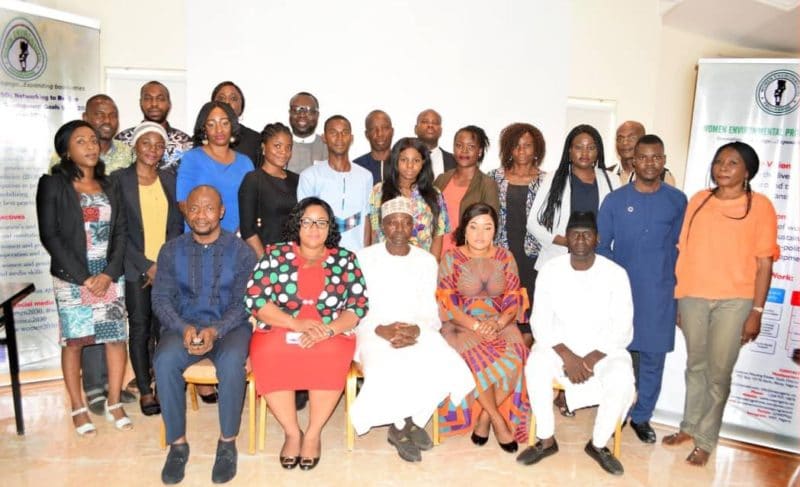Governments at all levels have been told to increase investment in renewable energy and create an environment that will open doors for more local and foreign players in the renewable energy sector. This will make as many communities as possible have access to mini-grid and off-grid energy systems as well as clean and affordable cooking energy.

This formed part of the resolutions at a policy consultation on the Sustainable Development Goals (SDGs) held courtesy of the Women Environmental Programme (WEP), on Wednesday, June 27, 2018 in Abuja.
This policy consultation was part of the activities of the Women2030 project, which created a platform for different stakeholders to discuss Nigeria’s SDGs’ plans, policies and programmes, and make necessary recommendations that will help the country realise the SDGs. Stakeholders at the event were drawn from the Ministries, Departments and Agencies (MDAs) of government, private sector, civil society organisations (CSOs) and the media.
Participants also agreed that MDAs should align their activities with the targets of their relevant SDGs and draw up actionable plans that will be implemented over time to achieve the SDGs targets. Until the MDAs work in line with the set targets of the SDGs, the country will be far from achieving the SDGs at the appropriate time, they stated.
Governments were likewise urged to ensure that all private and public schools are inclusive and have infrastructure for equitable and qualitative education which gives access to education to both the abled and children with disabilities.
“MDAs responsible for provision of water to the citizens should make concrete plans to ensure more Nigerians have access to portable water by expanding their distribution networks and exploiting more, the abundant water resources in the country for provision of portable water to the citizens,” emphasised the participants, adding that government should commit to implementing the Affirmative Action in the National Gender Policy for more involvement and meaningful participation of women in public decisions.
While recommending that the lawmakers translate the Affirmative Action into a law, the executive, they suggested, should be guided by the National Gender Policy in their appointments so as to achieve gender balance.
Senior Special Assistant to the President on Sustainable Development Goals (SSAP SDGs), Princess Adejoke Orelope-Adefulire, in an address presented on her behalf by Mr. Yahaya Hamza explained to the participants the different funding sources available for the implementation of SDGs in Nigeria. She also highlighted the strategies employed by her office as well as the different programmes being implemented by the office towards achieving SDGs.
She listed the funding sources for implementing SDGs in Nigeria to include: Annual Budgets, Debt Relief Gains and Conditional Grants Scheme.
After the Keynote address, participants were taken through the 17 goals and the 169 targets and how the SDGs could be mainstreamed in policies and programmes of organisations by Linda Akpami, an environment consultant.
This was followed by the presentation by WEP on the preliminary results of the assessment carried out on specific goals and targets of the SDGs in 11 states of Nigeria: Lagos, Delta, Rivers, Anambra, Benue, FCT, Nasarawa, Plateau, Kano, Yobe and Katsina.
The assessment sought information against the following SDGs and targets: Goal 1, targets 1.2 and 1.4; Goal 4, target 4a; Goal 5, target 5.5; Goal 6 targets 6.1 and 6.2; Goal 7, target 7.1; and Goal 13, target 13.2. However, only the quantitative results for Goals 1, 4, 5, 6 and 7 were presented at the policy consultation.
The result of the assessment revealed the following:
- High poverty rates across the states assessed as income levels of respondents with highest percentage fell within the income category of between N1 and N10,000 which translates to the fact that most respondents live on less than $1 a day.
- Many schools assessed had no infrastructure for equitable and quality education: Apart from FCT, less than 50% of schools in the other states had computers for use by teachers, pupils/students. Averagely, 90% of schools assessed had no infrastructure and materials adapted to the needs of children with disabilities. Similarly, many schools had no electricity, drinking water sources, toilets, and handwashing facilities.
- Major drinking water sources of respondents were found to be borehole, sachet water and wells across all the states as most respondents had no access to public pipe borne water. Similarly, an average of 10% of respondents across all the states assessed had no toilets in their households.
- An average of 80% of respondents had no access to public electricity supply, while over 60% across all the states depended on kerosene, firewood and charcoal as their major sources of cooking energy.
- None of the states assessed had a woman as a governor. The states also had by far, fewer numbers of women in their Houses of Assembly and as Commissioners than men.
By John Baaki Terzungwe
